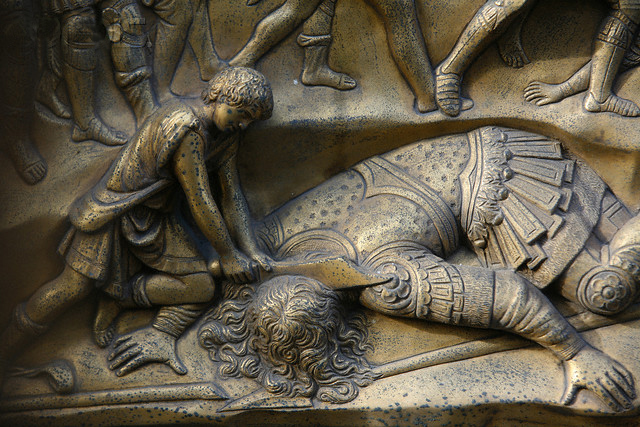帮助与说明
投稿信箱 / bedtimepoem@qq.com
微信号/ dushoushizaishuijiao
总编 / 流马
轮值主编 / 光诸 流马 金楠 冬至 曲木南 楚歌 唐晓丽 老汉
版面值守 / 小排 秋如线 黄璐逸 张看看 小鳜鱼 雪菲 菡纸 Scarrie 肖蕊 卡比丘
声优值守 / 五重 祭祀 张大顺 彭艳戎 格雷斯 小贝 小米 秋的童话 罗小早 雨衣 韬略
声优接引人 / 无语僧
运营 / 范致行

12 Nov 2006, Florence, Italy --- Detail of David and Goliath from the Gates of Paradise by Lorenzo Ghiberti --- Image by ?Fred de Noyelle /Godong/Corbis
这座城里住着一千万灵魂,
有的住上高楼,有些住在洞里,
但是没有哪个地方是为我们准备的,我亲爱的,没有哪个地方是我们的。
我们曾经有个国家我们觉得这是公平的,
看看地图集你可以找到它:
我们现在到不了那儿,我亲爱的,我们到不了那儿。
乡村教堂院里长着一棵老红豆杉,
每年春天它都吐绿翻生:
老护照做不了这个,我亲爱的,老护照做不了这个。
公使敲着桌子说,
「如果你没有护照,你在我这儿就是死人」:
但是我们仍然活着,我亲爱的,但是我们仍然活着。
去找委员会,他们会给我一把椅子;
礼貌地让我明年回去:
但是我们今天回哪儿,我亲爱的,我们今天回哪儿?
来到一个公开集会,演讲人站起来说,
「如果我们让他们进来,他们会偷走我们每天的面包」:
他是在说我们,我亲爱的,他是在说我们。
我想我听到了天边的雷声,
那是希特勒跨在欧洲身上,「他们必须死」:
噢,他在想着我们,我亲爱的,他在想着我们。
看那贵宾犬穿着小夹克戴着小项圈穿着小带子,
看那门打开一只猫咪钻进去:
但它们不是德国犹太人,但它们不是德国犹太人。
走进港口站在码头之上,
看那鱼儿游泳仿佛它们是自由的:
我和它们只差10英尺,我亲爱的,只差10英尺。
穿过树林,看到鸟儿在树上;
它们没有政治家唱得很轻松:
它们并非人类,我亲爱的,它们并非人类。
我梦见看到一座房子有一千层,
一千个窗户一千扇门:
没有一个是我们的,我亲爱的,没有一个是我们的。
站在一个大平原上此时下着雪,
一万个士兵列队走来走去:
他们在找我和你,我亲爱的,他们在找我和你。
作者 / [英国] W. H. 奥登
翻译 / 光诸
Say this city has ten million souls,
Some are living in mansions, some are living in holes:
Yet there's no place for us, my dear, yet there's no place for us.
Once we had a country and we thought it fair,
Look in the atlas and you'll find it there:
We cannot go there now, my dear, we cannot go there now.
In the village churchyard there grows an old yew,
Every spring it blossoms anew:
Old passports can't do that, my dear, old passports can't do that.
The consul banged the table and said,
"If you've got no passport you're officially dead":
But we are still alive, my dear, but we are still alive.
Went to a committee; they offered me a chair;
Asked me politely to return next year:
But where shall we go to-day, my dear, but where shall we go to-day?
Came to a public meeting; the speaker got up and said;
"If we let them in, they will steal our daily bread":
He was talking of you and me, my dear, he was talking of you and me.
Thought I heard the thunder rumbling in the sky;
It was Hitler over Europe, saying, "They must die":
O we were in his mind, my dear, O we were in his mind.
Saw a poodle in a jacket fastened with a pin,
Saw a door opened and a cat let in:
But they weren't German Jews, my dear, but they weren't German Jews.
Went down the harbour and stood upon the quay,
Saw the fish swimming as if they were free:
Only ten feet away, my dear, only ten feet away.
Walked through a wood, saw the birds in the trees;
They had no politicians and sang at their ease:
They weren't the human race, my dear, they weren't the human race.
Dreamed I saw a building with a thousand floors,
A thousand windows and a thousand doors:
Not one of them was ours, my dear, not one of them was ours.
Stood on a great plain in the falling snow;
Ten thousand soldiers marched to and fro:
Looking for you and me, my dear, looking for you and me.
很久以前,我喜欢过一首Richard Marx的歌Hazard。那首歌的灰暗绝望在所有的流行歌里跳出来,打中我。能够在一首歌里展现一个故事一部电影的并不多见,我从我的角度理解了逃离远走是什么意思。
那之后的某一年,在上海,我和一位组了乐队的女孩聊天,说起她在新疆的故乡。她讲述的故事让我再次想起Hazard这首歌,那些不顾一切想远走高飞的年轻人都带着故事和真正的伤口消失在故乡,如今坐在我的面前。
绝望可以如此之深,让生和死都变得更轻易。绝望的孩子们犹如被大风吹远的种子,除了想着逃离,并不在意任何地方。
W. H. 奥登的《逃亡布鲁斯》是另外一颗子弹。这首诗足以回过头去注解或标识出我在1989年到1993年 那些年的心情状态。那几年我在几个城市之间南来北往,心情也游移飘荡,找不到物理和精神意义上的故乡在哪里。奥登的悲苦是直白的,这首布鲁斯的大部分段落 都如同谣曲,你知道纳粹的黑影在无限逼近,几乎就在街角。但绝望并不仅仅在于此,整个星球无处可去的绝望才是绝望。你转遍地球仪,你找不到一个可安身之 处。你明白若还能够逃离,就不算是真绝望。
回 到这首诗的前两段,值得反复诵读的篇章,这就是超越政治和现实的句子。所有理想的失落,所有挚爱的离别,大约都可以用这种心情来比拟。人生这种东西,起初 出发时有朝气蓬勃,你可以在朗朗日光下大声读卡瓦菲斯的伊萨卡岛;待得歧路日多,暗夜来临,初心蒙尘,爱人消隐,你也许就是这个身处流亡之途的奥登。
是啊,总有一些人有坦途,而亲爱的,另一些人总在歧路上。
但不管怎样,总有一个地方,我们是回不去的,无论我们多么难过。
荐诗 / 朝南阳台
2013/08/04
近期评论